“A shadow, yes — a shadow that fell over all of our lives!”
Barnabas and Julia have been thrust into the far-off space year of 1995, which means they’ve already missed three seasons of Melrose Place and they’re not going to understand what anybody at the office is talking about. They’d better stay away from watercoolers altogether; you can’t be too careful.
But the time-tossed twosome have other things on their minds, like for example that their house got destroyed twenty-five years ago, killing most of their friends and driving the survivors out of their everloving minds. So Barnabas and Julia are snooping around, trying to find out what caused the catastrophe. I’d suggest taking a close look at Dr. Kimberley Shaw, who’s recently developed an interest in detonating apartment complexes, but they wouldn’t have any idea what I mean. You see what happens when you don’t watch Melrose Place? Let this be a lesson.
A heavy stone bust was perched awkwardly on the bannister in the Collinwood foyer, just waiting for a time-hopping medico to step on the spot marked X. There was a bullseye painted on the floor and a sign that said “Free Bird Seed,” but luckily, Julia Hoffman is a trickster herself, and she stepped out of the way just in time.
Fleeing from the house, Barnabas and Julia took a look behind them and saw a sneering stranger, glaring at them from the window, an illuminated exhibit of unfriendly ectoplasm indicating, in no uncertain terms, that he has more busts if Julia feels like coming back and trying for best two out of three.
So they’ve escaped unharmed, but it was a jolting experience, and it’s going to take a minute for Julia to regain her composure. Barnabas, naturally, is not helping a bit.
“Who could it have been at the window?” he wonders. “Was it the same man who tried to kill you?” He sparks up a couple candles. “There was something strange about his appearance,” he muses. “He was wearing clothes from another century! A ghost, from the past!”
Julia keeps thinking about the look on the specter’s face. “I can’t get it out of my mind!” she wails.
Barnabas shakes his head. “His arrogance!”
“No, it was more than arrogance — it was hatred!” Julia says. “No, it was even more than hatred — it was double hatred!”
Now, these people have seen ghosts before, plenty of times, and it shouldn’t be shaking them up like this. But that’s the point of this particular moment — they need to find a way to indicate that this ghost is scarier than any other ghost they’ve ever seen.
Because this isn’t the first time we’ve seen a handsome, silent, sneering ghost at Collinwood; he’s currently one of Barnabas and Julia’s closest friends, and he has his own bubblegum cards. The show’s taking another turn at the same screw that they turned only a year and a half ago, and it’s not like they can slip it by without anyone noticing. The audience has not forgotten Quentin Collins.
So if they’re hoping to put this over, they need to up the tension significantly, which means uncorking the E-word.
“It was the very essence of evil!” Julia cries, getting up from her chair. “I felt evil all around me. I was trapped by it!” She clutches her coat. “It made me aware of something deep inside me that I don’t even understand — as though, with that one look, he could concentrate every grain of evil I have in my nature! Make it grow, and grow…”
She turns to Barnabas. “You didn’t feel it?”
“Nope,” he shrugs. “I think the evil in my nature is pretty much as grown as it’s ever going to get.”
Meanwhile, over at Grey Gardens, Carolyn is brushing her hair. This is the Carolyn of 1995, who survived the Fall of Collinwood and then sat around for twenty-five years, getting older and battier. She’s currently inventing new childhood memories for herself.
“When I was a young girl, you used to brush it for me, remember?” she says to Mrs. Johnson, who doesn’t. I’ve got an episode guide in front of me that says that Mrs. Johnson started working at Collinwood in August 1966, when Carolyn was twenty years old. But this is what the Collins family does in their leisure time, they rewrite their history from the ground up. Twenty-five years later, there’s even more history to rewrite, and fewer Collinses to do it, so it’s no wonder Carolyn’s pulling a double shift.
Slipping into a fugue state, Carolyn fantasizes about a family reunion. Everyone’s coming back, she says: “My mother, and Quentin, and Uncle Roger…”
Mrs. Johnson tries to talk sense to her. “Carolyn, they’re not coming home…”
“Oh, but they are! And when they do, the house must be ready for them!”
Mrs. Johnson insists they’re never coming back, but Carolyn’s had decades to build up her defense mechanisms. “Don’t say that!” she snaps, but then she smiles, and settles back into her dream world. “Especially when it isn’t true.”
She starts flipping through a photo album, giggling, “Oh, we must make plans! We’ll celebrate with a picnic at the gazebo, and it’ll be a beautiful warm day, and David and I will go sailing with Quentin.” This is the second time this week that Carolyn’s talked about a picnic; she’s really got her heart set on it.
Then she takes a photo out of the album, and it’s Quentin and Maggie, at a picnic. Either this is the event that Carolyn’s obsessed with, or the Collinses of 1970 must have been picnic-mad. I don’t know where they think they’re going to spread a blanket out; they’re on the woods set, which is about sixteen feet square. It’s going to be a tight squeeze, they won’t even have room for ants.
Mrs. Johnson grabs the photo from Carolyn’s hands. “Where did you get this?” she demands. “That’s the first time that we saw him!”
“You don’t know what you’re talking about,” Carolyn says, and I agree with her.
“There!” says Mrs. Johnson, pointing at nothing in particular. “There he is!”
Carolyn disagrees. “That’s only a shadow.”
“A shadow, yes! A shadow that fell over all of our lives!”
It’s a great line, and a nice spooky moment, but honestly, I don’t know what she’s pointing at. I’ve looked at that picture, and I don’t see anything but the picture. That’s how badass this new ghost is, he appears in shadows that aren’t even there.
But they have to hype the ghost, because they keep undercutting the other obvious source of tension. Later on, Mrs. Johnson tries to tell Barnabas and Julia to stop poking at old wounds.
Barnabas: We simply must know what happened — who this spirit is, and how it got control of Collinwood!
Mrs. Johnson: Why? What good will it do? You can’t prevent it, why add the burden of those sorrows?
Julia: We were just trying to tell Carolyn that we can prevent it.
Mrs. Johnson: You can prevent it? You’re as mad as she is!
Barnabas: Mrs. Johnson, look at us very carefully. Now, you yourself noticed that we hadn’t changed since we disappeared twenty-five years ago. Some terrible disturbance in time brought us here!
Julia: And when we get back to 1970, we can stop everything that’s happening here!
So that’s an astonishing thing to say, because the characters have exactly zero reasons to believe that they can get back to their own decade. They don’t have a time machine, or even a stack of I Ching wands. That terrible disturbance in time was a one-way trip, a freak side effect of the Parallel Time room spitting them back into our universe as it crashed and burned.
And the world that they find themselves in is obviously a timeline where they didn’t get back. Everybody keeps telling them that. But here they are, unbothered.
This only makes sense if Barnabas and Julia know that they’re the main characters, and understand what kind of story they’re in. Dark Shadows is now a boomerang time travel show, where the characters take a trip to another decade and then return to home base. So even when there’s an exception, like the one they’re currently standing in, they’re still convinced that the pattern will hold, and they’re right.
It’s a strange thing for the audience, seeing the characters completely undaunted by what ought to be a horrifying predicament, like they’ve personally decided what part of this experience is suspenseful and what isn’t. Right now, it works, because traveling to 1995 is such a delicious surprise. But the show is dancing on a paper’s-edge; if they’re really taking this format for granted, then they need to come up with a new way to surprise us, and I’m not sure they have one.
So this ghost better be something special. It’s not enough to be Quentin Junior, scaring everyone into abandoning ship and taking up residence at the next-door neighbor’s. This ghost needs to be a ruthless killer like we’ve never seen before, a world-breaker.
“It all began when the days were so beautiful, you couldn’t help but be happy,” Mrs. Johnson explains. “There was a spirit of joy at Collinwood; there was a feeling that hadn’t been there in a long time. There was so much love among all of us at that time… until…”
That’s key to the story, then, that Collinwood was going through a mythical Camelot stage like we’ve never experienced. Collinwood has never been a happy place; it’s gloomy and half-deserted, filled with terrible secrets and constantly under siege. But now they have to reframe it as a stately pleasure-dome, just one long string of summertime picnics.
And then Mrs. Johnson runs out into the woods, where the Big Bad finds her, and Camelot topples for good. Carolyn finds her, sitting up against a tree, her face frozen in horror.
“No, please,” Carolyn chokes. “You’ve always been so good to me… don’t hurt me now! Please, reach out and take my hand… Mrs. Johnson? Please take me, and hold me like you did when I was a little girl… help me! Help me!”
It’s heartbreaking, and it needs to be. This Big Bad has to be the Big Worst we’ve ever seen. The future of Collinwood depends on it.
Tomorrow: You Oughta Know.
Dark Shadows bloopers to watch out for:
At the beginning of act 1, there’s mist blowing through the Old House.
Barnabas lights a couple of candles, shakes out the match and then just drops it on the floor. Is that a thing that they do? I don’t think I’ve ever noticed it before, but they’ve just done it in two episodes in a row. It’s fantastic.
Julia’s mic cuts out a couple times in act 1, and we miss some fragments of her monologue about evil.
Barnabas tells Julia, “Apparently, my powers protect me, or perhaps because I’m not truly human, I’m not immune — I’m immune to those, that particular weakness.”
When Carolyn turns from the photo album to chide Mrs. Johnson, the housekeeper is standing in Carolyn’s light.
When Mrs. Johnson starts telling her story to Barnabas and Julia, there are some bangs and scrapes from the studio.
When Carolyn accuses Barnabas and Julia of killing Mrs. Johnson, the dead woman blinks.
When Barnabas and Julia duck into the Collinwood drawing room, Barnabas knocks over a glass, which breaks.
There’s another tape edit when Barnabas and Julia watch Carolyn walk upstairs.
The playroom music plays for a few seconds as Carolyn approaches the playroom, and then stops.
Tomorrow: You Oughta Know.
— Danny Horn

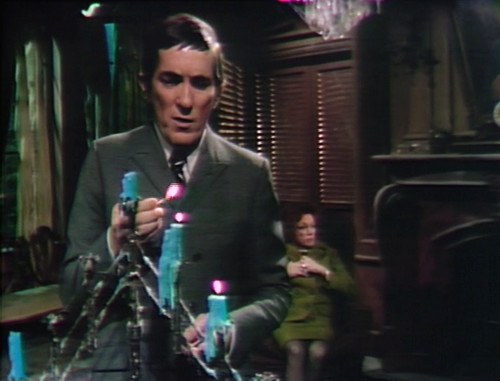
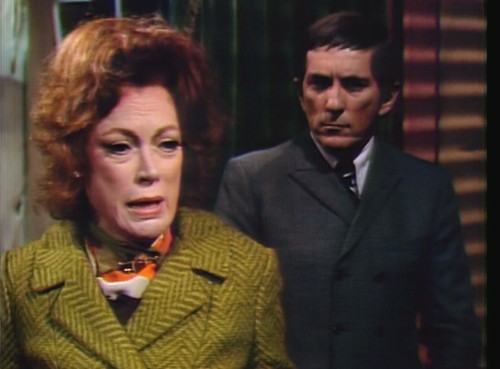
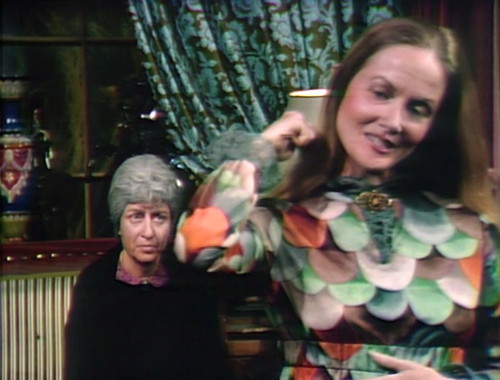

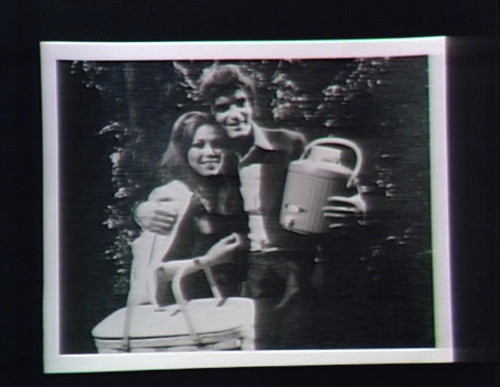
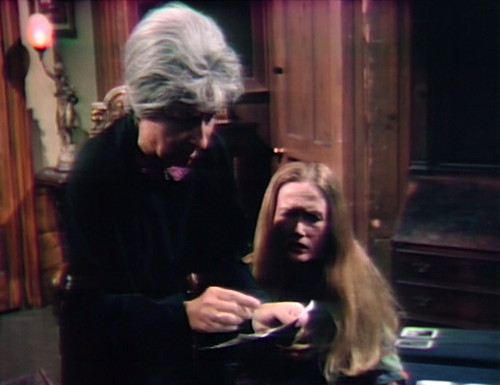

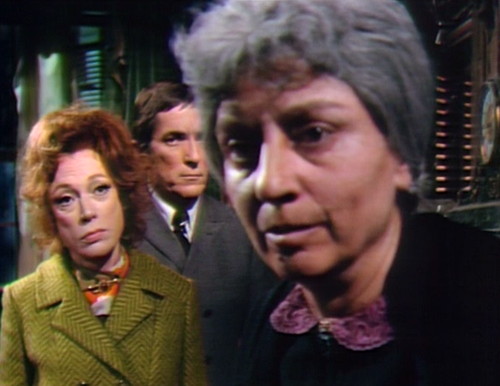
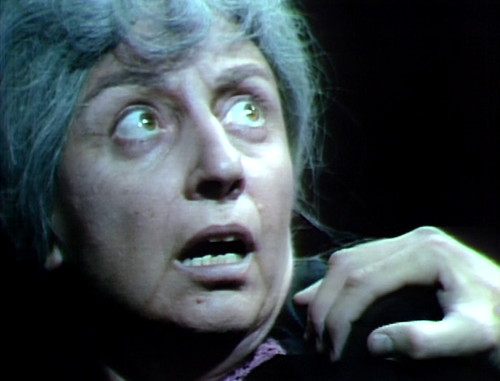
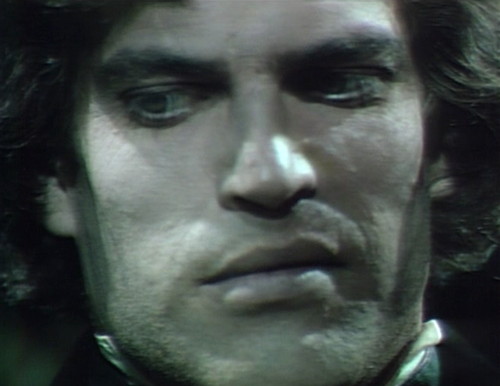
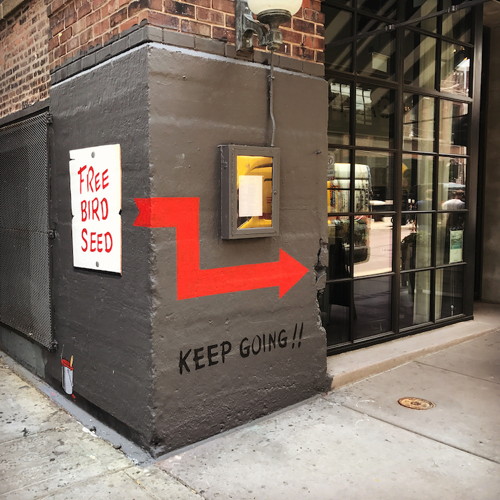
Mrs Johnson is speaking in relative terms.Things were infinitely better back in the summer of 1970 compared to this post-apocalyptic But she also suffers from the effects of nostalgia where people selectively remember with fondness a bygone era that in reality wasn’t as sweet and happy. Who knows, maybe Carolyn was functionally kooky but went off the deep end when Twin Peaks went off the air. She does act like Sarah Palmer.
You’re so right. Barnabas and Julia really had no way of getting back to 1970 and changing history. And they didn’t seem to have much of a time-travel action plan beyond trying to extract information from the survivors of the great disaster.
It’s really astounding, how Barnabas and Julia, supposed playthings of any Fate that feels like knocking them off the shelf and throwing them at the wall for a while, simply and continually shrug off any idea of immortal doom and just go well, we’ll find another time band or whatever, after we defeat this ghost.
I guess they’re so used to Barnabas slipping in and out of a fanged state that they merely refuse to concede any further territory to They. Angelique and her petulant curse, more blinded to future consequence than Vicki could ever be, is their enemy; everything else is just annoying static they’ll tune out eventually.
It’s interesting, the people at Collinwood were the most happy when Barnabas and Julia were away in Parallel Time. …hmmm, what does that tell us?
It tells me that Barnabas and Julia had such toxic karma that the Collins family would have fared much better by disowning Barnabas and by not allowing that quack of a doctor ever to set foot in the house!
And Barnabas and Julia have only been in 1995 a few days, and already the remaining family are being killed off. They were doing okay for the last 25 years, and then here comes Barnabas and Julis.
I think Barnabas is just one of those self-involved kind of people who assumes that he’s the protagonist of the Story of the Universe. I’ve known one or two similar people in my life.
Department of wierd coincidences. This episode aired July 23,1990 whivh woikd mean Mrs. Johnson died July 33 1995. Clarice Blackburn died August 5, 1995.
Wow.
July 33? My god… Barnabas and Julia broke time! July has 33 days now!
I have two extra days to get my mom’s birthday present!
Mrs. Johnson: “Those were good times at Collinwood. I was earning two paychecks instead of just one, working for Burke Devlin as a spy to get information about Roger and that accident. Two paychecks, one of them under the table and tax free. Those early days at Collinwood, aside from working for Mr. Malloy, really were the happiest… except when that young David stole my package of cigarettes to give to that Matthew Morgan!”
In the early days when Barnabas would light candles in the Old House drawing room, like when being questioned by Sheriff Patterson on the whereabouts of Willie when Maggie was found in Eagle’s Hill cemetery, he would shake out the match and toss it in the fireplace. I guess he figures he’ll be heading back to 1970 soon, so whatever he drops on the floor in 1995 won’t be there in 1970. Like the 1995 story itself, it would soon be negated.
I hope everyone’s enjoying the 1995 playlist…
It’s getting better with ‘Wonderwall’ and ‘Hotstepper’.
Not sure your blog’s demographic grew up with ’90s music though.
Waiting for the “99 Luftballons” entry.
You need to read a blog on “Deutschland ’83” if you want Nena.
Whoops!
I was looking at the date on the live version.
Too bad Barnabas and Julia didn’t land in 1997, so we could have had a “Barbie Girl” blog entry…or 1998, for Cher’s “Believe”.
I’d be down for 1984 and “How Soon Is Now?”
2000 – Tamia’s Stranger In My House (club mix, of course).
Oooh, that’s perfect.
I did. 🙂 I was 16 in 1995, really getting into DS now that we had the SciFi Channel, and thinking how amusing it was that there was a “flashforward” to 1995 coming soon. 🙂
I was just about to thank you for the flashbacks to my sophomore and junior year of high school — I miss the 90s more than I can say!
I’m sure the jukebox at the Blue Whale is still playing the same three guitar instrumentals.
Oh, I do hope so!
I always wondered if there was a pinball machine, off in an alcove, that we never got to see.
“Meanwhile, over at Grey Gardens, ” It is phrases like that which have resulted in my utter addiction to this blog.
^ Yes!
Oh, I thought Julia was already familiar with the essence of evil from that time she cold bloodedly murdered Dave Woodard.
Everyone seems to forget that!
Samantha Harris wrote, “Oh, I thought Julia was already familiar with the essence of evil from that time she cold bloodedly murdered Dave Woodard.”
And so the heroine’s murder of the good doctor is consigned to “the forget about box.” How convenient. 🙂
Technically, she was only an accessory. Technically. But try telling that to a ghost.
I’d be awfully peeved at Julia if I were Dead Doc Dave.
Peeved enough to erase all documents of her attending medical school, and graduating? “Praticing medicine without a degree…”
http://mina225.wixsite.com/dsfanzine/aftermath
“Just making up medical terms…”
And even more so at Barnabas, who “pulled the trigger”, then sent along a FAKE of his ghost to torment Julia! Though I bet he enjoyed the “Julia episode” as much as we did, regardless.
That episode was among Jonathan Frid’s favorite Dark Shadows scenes, which he was planning on presenting at the 2012 DS festival….
Dead Doc Dave would be particularly incensed with Barnabas, yes.
I loved the whole thing, of course.
Reminds me of what Sherlock Holmes said:
“When a doctor goes wrong, he is the first of criminals. He has nerve. He has knowledge.”
Samantha Harris wrote, “Oh, I thought Julia was already familiar with the essence of evil from that time she cold bloodedly murdered Dave Woodard.”
All of us young children who would watch DS right after school in the 1960s could learn so many lessons from DS, such as:
Yes, it is true Julia and Barnabas may be murderers. But it’s perfectly OK to root for a murderess and a serial killer vampire, because this ghost Gerard is even more evil than they are. So by you’re rooting for Julia and Barnabas to win, you’re merely choosing the lesser of two evils.
The show had so many “teachable moments” for all the young children, didn’t it?
Another teachable moment – the time Barnabas was terrorizing David and none of the adults would believe the poor kid when he begged for help. Not only that, he was shamed and scolded by his father for telling “lies” about a family member.
Kinda makes your blood run cold, doesn’t it?
And, of course, we learned the importance of keeping up with your automobile’s maintenance schedule (especially those all-important brakes); as well as the need for boys to learn a trade (like auto repair).
We also found out that if you’re gonna use a fireplace poker to hit your spouse, use BOTH hands, and follow through on the swing!
(And don’t trust his shady pal to clean up the mess, either.)
I don’t remember a “Child Psychology Consultant” listed in the rolling credits at the end of each episode! 🙂
If the writing team had been beholden to the suggestions of a psychology “expert,” then all references, for example, to Gerard’s plan to kill the David and Hallie might have been removed, lest it give the children watching nightmares or cause them other psychological damage. In contrast to DS, Sesame Street and the ABC’s Afterschool Specials come to mind as shows deemed generally acceptable for all young kids to watch during that era.
Basic psychology was only beginning to be mainstreamed into the public consciousness in 1970, and didn’t become quite popular until approx 20 years later when talk shows – Donahue, Winfrey, Springer, etc. – became saturated on TV in the 80s and 90s.
So Dan Curtis and the writing team were lucky they got away with quite a lot of material which might not have been allowed on TV outside this unique, 1960s-era, afterschool horror niche. Some of the material they managed to sneak into the scripts still amazes me to this day …
Yes indeed. Laura trying to get David to walk through flames, Barnabas terrorizing David, Quentin possessing David and Amy and leaving the former on the brink of death were very heavy. Other soaps had kids get sick and be in life or death situations, but Dark Shadows had main characters/family members purposefully brining harm to a child. They didn’t repeat that in the 1991 prime time version of Dark Shadows.
I remember the first time I saw the episode where Barnabas and Chris dig up and open the baby’s coffin. That was strong stuff for the after school crowd!
It’s no wonder we kids were so mesmerized by the show. What rating would it have today – M for Mature? PG-13 or R for violent content?
Not that I’m criticizing the show or Dan – I have no regrets about watching it when I was a kid. Really, today’s video games are a lot more violent than good ol’ Dark Shadows.
Still – some scenes haunt me to this day – like little ghost Sarah showing David Barnabas in his coffin. That was some frightening after school viewing.
Roger was a rotten dad in the pre-Barnabas episodes. He hated his kid even before the bleeder valve incident!
Yes, but Roger already knew that little David was “an incipient psychopath”!
That was different, though. See, Barnabas made her and he’s the love of her life and–oh wait, not different at all.
I like the idea of Gerard “growing the seeds of evil” in Julia–like Julia doesn’t have a garden that would put Rapunzel’s stepmother and Rappaccini to shame–and her looking at Barnabas with a new, colder glint in her eye…
Mike’s got a good point: Everything was so much better when Barnabas and Julie disappeared. While they were in PT, “It all began when the days were so beautiful, you couldn’t help but be happy…There was so much love among all of us at that time… until…”
Given the rest of the story lines from 1797-1970, things were pretty miserable.
As suspenseful as the 1995 story was, as soon as I saw Gerard and later Daphne dressed in period costumes, I knew another trip back in time was only a short time away.
Robert Sharp wrote, “As suspenseful as the 1995 story was, as soon as I saw Gerard and later Daphne dressed in period costumes, I knew another trip back in time was only a short time away.”
Ditto. Absolutely loved the 1995 trip!!! But how dumb did they think us 10-year-olds were?
Though only approx 10 years old at the time in 1970, it only took me a few episodes before realizing — and frankly feeling just a “Tad” disappointed — that Gerard and Daphne was going to be essentially a replay of Quentin and Beth’s haunting of Collinwood.
Sure, Dan and the writing team changed the time period from 1897 to 1840, and Dan Curtis obviously felt the need to ask Bob Cobert for another new musical number, “The Playroom Theme,” to create the new mood. But Dan and Bob had just finished a similar musical stunt in PT 1970 by introducing “Ode to Angelique” as the new tune to generate added interest as “Quentin’s Theme” had done before that.
The idea that each new story arc needs a new time period, with new costumes, plus a new song — followed of course by a new spate of mass murders — is quite fun. But by this time one might also argue it’s also becoming very formulaic and predictable. So how dumb did they think us 10-year-olds were?
Say, isn’t that the same tree they found Abigail dead against back in 1795?
Probably the very same tree. Funny. Good catch, Lieutenant!
“At the beginning of act 1, there’s mist blowing through the Old House.”
Mist? It looks more like someone is smoking right next to the camera…
Mrs Johnson remembering Collinwood’s Summer of Love…
How do we know they’ve returned to the right universe? There’s a different desk chair and curtains and the wall sconce in the hallway looks different. Maybe things actually had been better in whatever parallel 1995 world they went to and Mrs. Johnson was just telling the truth.
When they go back to 1970 the original chair and curtains are back! So when does Barnabas decide (in the middle of trying to prevent the destruction of Collinwood) that he simply MUST order green velvet drapes? Never, that we see. There seem to be a lot of problems with time travel and sometimes they affect set design.
I have a theory that could explain Mrs Johnson brushing Carolyn’s hair when she was little.
In the early episodes, Carolyn talks about having gone to school in town. How did she get there?
She can’t have walked; it was miles away, much of it along a winding road with several blind curves. Her mother never left the grounds during those years, she couldn’t have driven her. Roger was living in Augusta with Laura. The only servant was Matthew. Matthew and Carolyn don’t seem at all close; it doesn’t seem likely that he drove her to school every morning. If a school bus came up the hill to Collinwood day after day, the kids who rode it couldn’t have maintained the attitude Carolyn describes, whispering behind her back about her living with the witch in the haunted house. Sooner or later they’d have started talking to her face to face about it.
Carolyn also talks about Bill Malloy being more like a father to her than any other man, and the two of them do have a cozy relationship. Carolyn is also very quick to fall in with Mrs Johnson when Burke pitches the idea of her joining the household staff at Collinwood. So I think we have to conclude that Bill Malloy and his housekeeper were in charge of getting Carolyn to school in the mornings. Malloy was on the fishing boats, so that would require an early start to the day. There were probably many days when little Carolyn was still in her pajamas when she got to the Malloy house. On those days, Mrs Johnson brushed her hair while the water came to a boil for breakfast.
Or it happened in 1966 when Carolyn was a 20 year old ‘little girl’. It was part of Mrs Johnston’s cunning plan as a spy for Burke. Women always tell all the secrets to their hairdressers, don’t they?
Yes, Carolyn has been a haggard crazy lady for 24 years at that point- in Mrs Johnson’s memory, the post-adolescent Carolyn of 1966 must seem to have been a dream, an impossibly delicate little blossom, something like a newborn.
But I still like my theory! I’m sure the writers weren’t thinking of it- none of them had been on the show in 1966, probably none of them knew that Mrs Johnson wasn’t the housekeeper in episode 1. But it fits everything the fans know, and it would have fit so well with what the actresses and the director knew that it could have been intentional for them, if only on a secondary level of intentionality.
Or, how about just: Carolyn is crazy, and doesn’t know what she’s talking about? At all?
By landing in 1995, Barnabas and Julia have missed the disco era entirely. They should be grateful and not try to go back.
you can say that again!
The hair, the curled lip…it’s the ghost of Elvis!
The Free Bird Seed comment made me laugh out loud. I love reading this blog as a I go through the series! Watched the show as a kid some but didn’t finish the whole series. It’s such fun! Julia and Barney teaming up to solve a mystery is all I need! They really belong together!